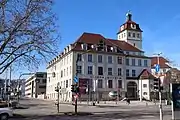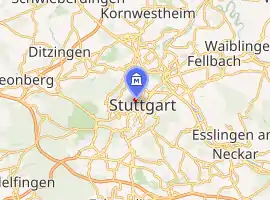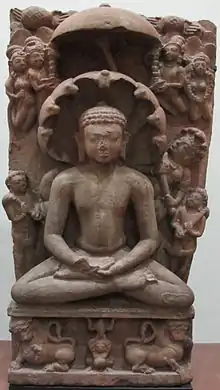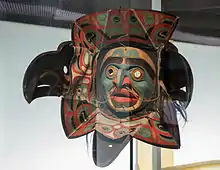Linden Museum
The Linden Museum (German: Linden-Museum Stuttgart. Staatliches Museum für Völkerkunde) is an ethnological museum located in Stuttgart, Germany. The museum features cultural artifacts from around the world, including South and Southeast Asia, Africa, the Islamic world from the Near East to Pakistan, China and Japan, and artifacts from North and Latin America and Oceania.
 | |

| |
| Established | May 28, 1911 |
|---|---|
| Location | Stuttgart, Germany |
| Collection size | Ethnological |
| Website | www.lindenmuseum.de |
The museum traces its origins to the collection of objects amassed by the Verein für Handelsgeographie (Association for Trade Geography) in the 19th century. The namesake of the museum is Karl Graf von Linden (1838–1910) who, as president of the Stuttgart Verein für Handelsgeographie, took an interest in assembling and organizing the collection, and invited explorers of the caliber of Sven Hedin and Roald Amundsen to Stuttgart.
In 1911, the collection was established as a private museum and its current building was constructed. After suffering extensive damage during World War II, the building was restored in the 1950s and the municipality became its custodian. Since 1973, the museum has been jointly administrated by the city of Stuttgart and the state of Baden-Württemberg.[1]
Gallery
 Parshvanatha Sculpture, India, 7th Century
Parshvanatha Sculpture, India, 7th Century Parshvanatha, Sandstone, India, 10th Century
Parshvanatha, Sandstone, India, 10th Century Sky King (Lokapala), Japan, Kamakura period (1185-1333)
Sky King (Lokapala), Japan, Kamakura period (1185-1333) Elephant, ceramic, Iran, 13th century
Elephant, ceramic, Iran, 13th century Nuxalk transformation mask, Canada, 19th century
Nuxalk transformation mask, Canada, 19th century Tree mask the Ekpo-federal, Africa, 19th century
Tree mask the Ekpo-federal, Africa, 19th century
External links
References
- "Archived copy". Archived from the original on 2011-01-28. Retrieved 2010-01-25.CS1 maint: archived copy as title (link)
| Wikimedia Commons has media related to Linden-Museum. |
